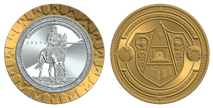1. What countries have joined the European Community in the last year, and will they mint Euros?Bulgaria and Romania joined the European Union on January 1 2007. This, however, does not automatically qualify them to join the euro. There is a long and tedious process of bringing their economies "up to speed", known as the Exchange Rate Mechanism. Only when a country proves it has the ability to maintain it's economy is it allowed to join. Then, of course, there are several members of the Union (like Great Britain) that don't want to join the euro at all.
2. Is there any likelyhood that Great Britain would change its coinage to Euros?When the euro was first formed, Britain opted out; the only EU member to do so. The pound is not pegged to the euro. Were it to decide to join the Eurozone, it would be treated the same as a country that had just joined the Union. At the moment, public opinion is still against joining the euro.
3. Are any of the commemorative Euros issued into circulation?The 2 euro commemoratives are. Each country is permitted one a year, and there have also been a couple of Europe-wide series of commemoratives. These are recognized as being legal tender throughout the Eurozone, just like any other 2 euro coin.
This wikipedia page lists them all. Other denominations of non-standard design are only legal tender in the country that issued them.
4. What is the most rare, and hardest to come by Euros? That is, what countries?That depends on where you are. Coins for each country are released into circulation in those countries, but euros freely cross borders, so you commonly see German euros in France, and vice versa. "Insular" countries not directly connected to other Eurozone countries, like Finland, Ireland and Greece, tend to be harder to find in "mainland" Europe.
5. Has any country changed its design from the original Euro?The common design on the reverse has changed, in 2007, to reflect the fact that the Union was now much larger than shown on the old maps. For the national obverses, a new ruling has strongly suggested that coins be redesigned to make it more obvious which countries the coins come from; Finland and Belgium have already changed theirs to comply. Austria, Germany and Greece are yet to do so.
6. Has the Euro monetary system worked well for the European Community?You'll have to ask a native, and natives from different parts of Europe may well have different answers. Certainly for tourists and travellers, it means far less hassle with changing money.


